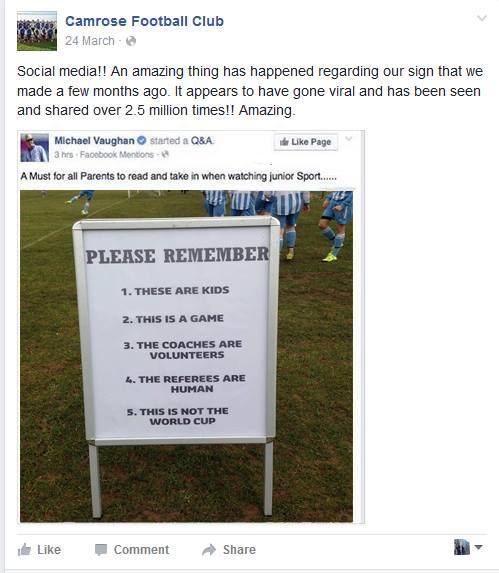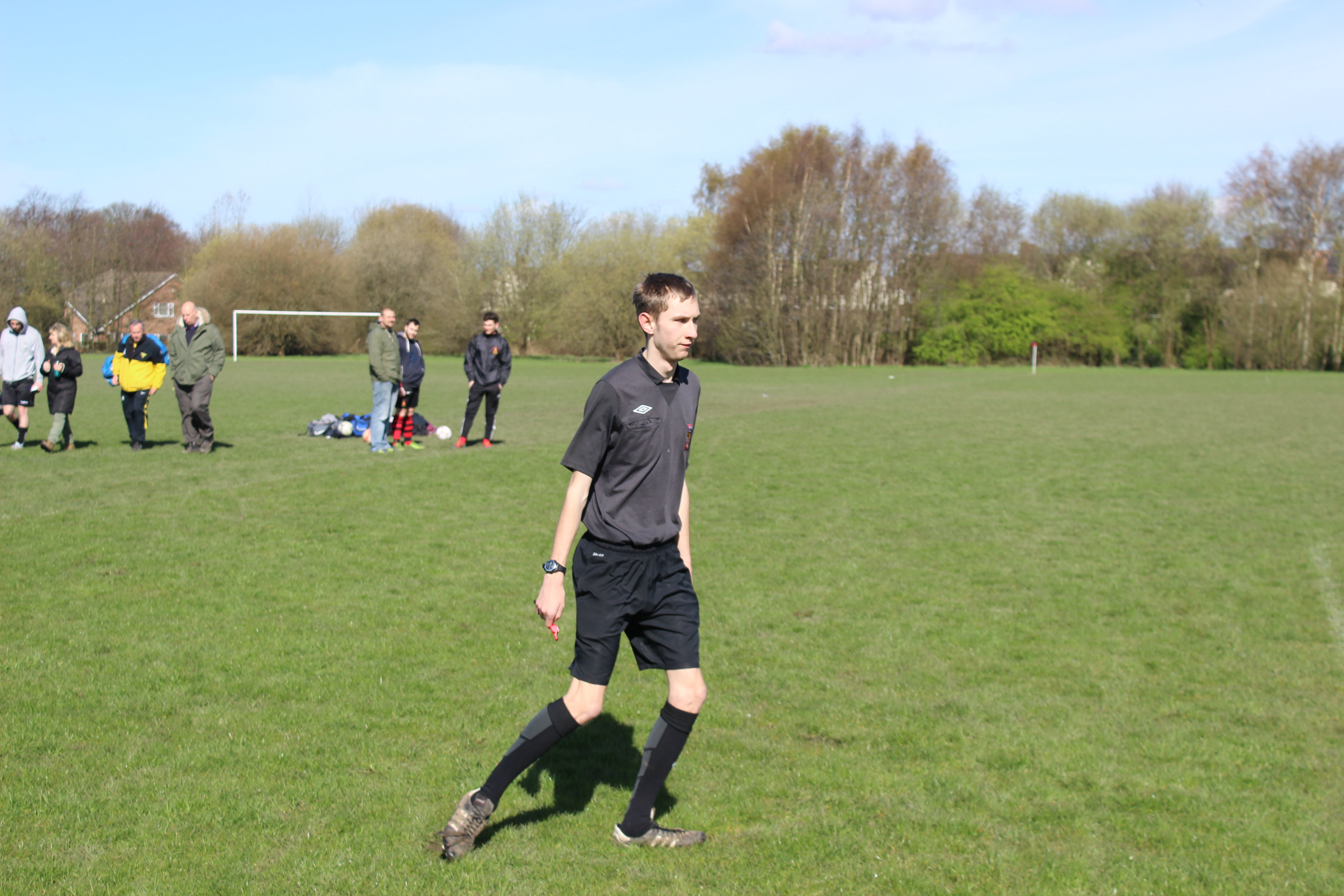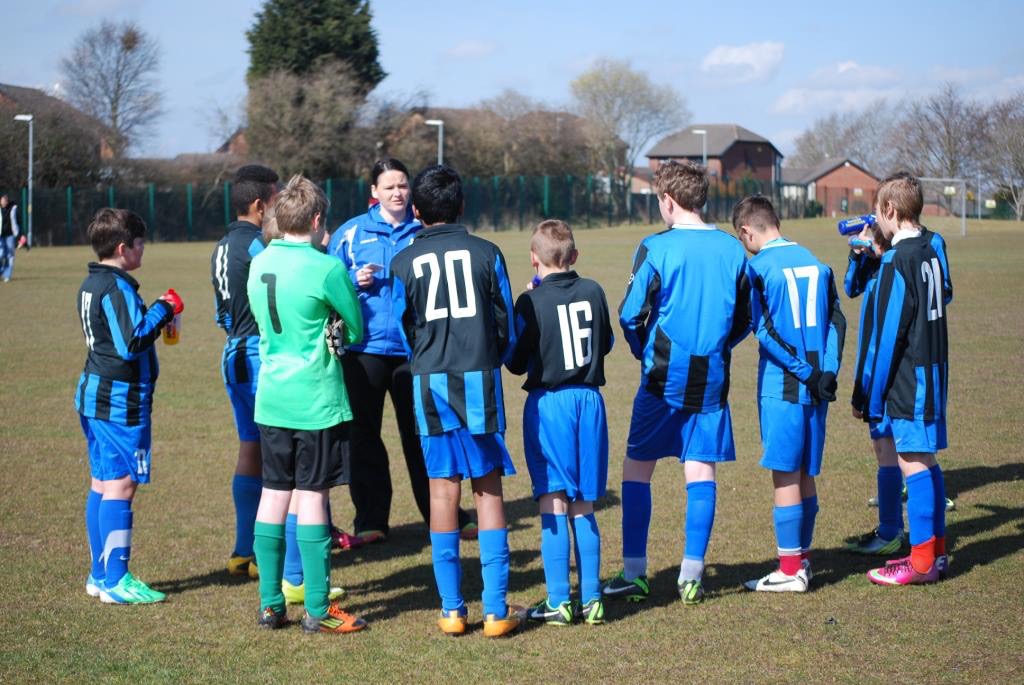A PICTURE of a ‘Respect’ sign shared by a Welsh football club to prevent abuse has been seen by millions of people on Facebook.
The image of the sign, designed to give parents a gentle reminder that grassroots football isn’t the World Cup, has captured the imagination with more than 40,000 likes, 3,000 comments and 2.5 million views.
The message was so powerful that it even grabbed the attention of former England cricket captain Michael Vaughan.

Camrose FC, an amateur club in Pembrokeshire, west Wales, has been ‘astounded’ by the response to the sign they position at their pitch entrance – and club secretary Dave Howarth believes it has had a positive effect.
“Our first team manager spoke to someone at a match one day who said they’d seen a sign to keep parents in order so we held a committee meeting and decided to make our own to remind people it’s only a game,” he said.
“When we first uploaded it, everyone commented that it was a good idea and I think it’s had an effect as it adds humour by saying it’s not the World Cup and tells people what grassroots football is all about.
“It’s a relatively new concept but it’s simple and resounds with everyone. We have 20 football teams and everyone is astonished it’s all over the internet and came from us because we’re only a rural club in Wales.
“We haven’t had it up long as we had no junior football over the winter because of flooding so for it to go viral so quickly is even more phenomenal.”

The image was also shared by Haughton Green Juniors FC in Denton, Greater Manchester, who are looking to install a similar sign themselves next season.
“I spotted someone had shared their Facebook post and I liked the ethics of it because it says it how it is and everybody agrees with it,” said club secretary Vicki Williams.
“You get some parents and coaches who think it’s a Premier League game, shout at their kids and charge up and down the touchline.
“It’s non-competitive yet some people go over the top. There’s a humorous element to the sign but it’s conveying a serious message.
“Referees get some stick too – we may not always respect the decisions but they’re in charge. In our league they’re quite young but it’s a learning curve for them.”

Another supporter of the sign is junior football referee Alex Byrom, who ‘agrees wholeheartedly’ with its principles and thinks all clubs should have one on display.
“It should be mandatory for every amateur club, no matter what age group,” said the Derbyshire-based official.
“It provides a simple list of rules for everyone involved to follow – I would add to it anyone found to be shouting abuse in a negative manner on or off the pitch shall be removed.”
Alex, who has previously experienced abuse himself, is calling for a better example to be set at professional level to help combat abuse and harassment of referees.
The 20-year-old added: “I think Premier League and Football League referees need to be told to give a red card more often for dissent and similar offences – the more red and yellow cards given the quicker they’ll realise it won’t be tolerated.
“I think more should be done at professional level to make them more aware that they’re role models for kids because they copy them so, if that improves, we might see a significant drop in abuse towards referees from players, coaches and parents.”
According to the FA, 60 per cent of referees experience verbal abuse at least once every two games and over 19 per cent have endured physical abuse.
From his own experiences, Alex feels the level of abuse and harassment has dropped since he first took up the whistle but admits it will always be inevitable.
“At the beginning it was definitely on the rise although over the last two years it’s probably gone down a bit, particularly in open age football,” he said.
“There’s still lots to be done in youth football but it’s going in the right direction with more clubs becoming Charter Standard so respect has to be there.
“But spectators are going to shout for a decision the referee may not see, it’s human nature, so I don’t think you can stop abuse entirely.”

Tammy Snape has won several awards as a youth coach but has also experienced the other side having taken a refereeing course.
She has a positive outlook towards referees and thinks the problems they face stem from the sidelines, which creates an intimidating environment for players as well as officials.
“I think the FA’s training now is geared up to respect referees so I don’t believe a lot of the abuse comes from coaches but from parents,” she said.
“They’ve come to watch little Johnny play and don’t understand the rules. They’ve just come to enjoy the game and it can often lead to them becoming very agitated.
“It’s lovely for parents to watch their children but they often get overexcited and shouting can lead to shy children backing off and not wanting to participate.
“It’s the same for referees and I believe parents should be much further away than the Respect barriers allow because they’re too close to the pitch.”
LISTEN: Tintwistle Athletic youth coach Tammy Snape and Glossop Juniors Under 7s manager Jon Matthews discuss where abuse of referees manifests from and how it can be prevented.
Paul Abbott, a senior county referee who has been officiating for nine years, agrees parents can be the main instigators of abuse and it can put people off becoming referees.
“I tend to referee Under 15s and 16s but I’ve seen younger referees who’ve asked me to watch them and, unfortunately the way some people behave, referees who are 15 years old are intimidated by some language,” he said.
“I think a lot of people are put off, particularly at junior age. The Respect campaign hasn’t worked in my eyes because we’re still seeing abuse frequently.
“To prevent it, it must come from managers. They have to knuckle down and tell parents and their players to cut it out because they won’t otherwise.”
The number of referees has risen from 12,000 to 27,000 since 2008 but between 6,000 and 7,000 referees are leaving every year, the FA report.
Laurence Jones, the FA’s Head of League and Club Services, is confident the Respect campaign – launched in 2008 to address unacceptable behaviour – has been successful to an extent but accepts they cannot rest on their laurels.
He said: “We don’t want incidents of abuse in football – there’s no place for it. To put it in context, there’s around 1.2 million fixtures that come under the FA’s jurisdiction.
“The number of extreme incidents is very minimal, less than one per cent, which is a significant drop since the Respect programme so it’s clearly working.
“But let’s work on the basis one is not acceptable so there’s no room for complacency and the FA remains vigilant.
“There has to be a constant review of how we support clubs and leagues because they’re ran by fantastic volunteers and there shouldn’t be an unacceptable environment for young people.”
Despite the increased uptake, 20 per cent of grassroots games are still played without a qualified referee – and, although positive steps are being taken to reduce abuse, retaining officials is proving harder than ever.
Vote in our poll to have your say on your own experiences of grassroots football:














Recent Comments